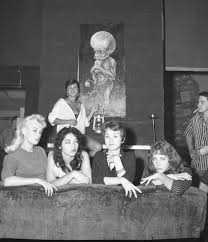beatnik

n. 奇装异服言行乖僻的人;“垮了的一代”的成员
n.
反传统一代成员, (俗称)披头族的人;
变形
复数:beatniks
英英释义
beatnik[ 'bi:tnik ]
n.a member of the beat generation; a nonconformist in dress and behavior
同义词:beat
双语例句
用作名词(n.)
He created beatnik chic, African-style beaded dresses, peasant-inspired skirts, and leopard prints.
他创造了垮掉了一代的别致款式,非洲式珠状的衣服,从乡下人那得到灵感的裙子和美洲豹图案。
If you meet Ai Weiwei on the street, you might take him for an ex-hippie who dropped out of college to be a beatnik.
假如你在街头遇到艾未未,你很可能会把他看作是一个辍学成为垮掉的一代的前嬉皮。
权威例句
William S. BurroughsBeatnik.
Beatnik
Beatnik takes to the information superhighway
The Auto-Beatnik, the Auto-Critic, and the Justification of Nonsense
Beatnik Rutabagas from beyond the Stars by Quentin Dodd
The Origin of Beatnik
Memoirs of a Beatnik
Mister Joans, to You: Readerly Surreality and Writerly Affiliation in Ted Joans, Tri-Continental Ex-Beatnik
When Do We Begin Teaching Beatnik Poetry?
beatnik (n.)
coined 1958 by San Francisco newspaper columnist Herb Caen during the heyday of -nik suffixes in the wake of Sputnik. From Beat generation (1952), associated with beat (n.) in its meaning "rhythm (especially in jazz)" as well as beat (past participle adjective) "worn out, exhausted," but originator Jack Kerouac (1922-1969) in 1958 connected it with beatitude.
The origins of the word beat are obscure, but the meaning is only too clear to most Americans. More than the feeling of weariness, it implies the feeling of having been used, of being raw. It involves a sort of nakedness of the mind. ["New York Times Magazine," Oct. 2, 1952]
"Beat" is old carny slang. According to Beat Movement legend (and it is a movement with a deep inventory of legend), Ginsberg and Kerouac picked it up from a character named Herbert Huncke, a gay street hustler and drug addict from Chicago who began hanging around Times Square in 1939 (and who introduced William Burroughs to heroin, an important cultural moment). The term has nothing to do with music; it names the condition of being beaten down, poor, exhausted, at the bottom of the world. [Louis Menand, "New Yorker," Oct. 1, 2007]
1. Every day of sunshine strengthens the feelings of optimism.
每天晒太阳让人心情更加开朗。
来自柯林斯例句
2. The air was thin and crisp, filled with hazy sunshine and frost.
空气稀薄清新,其间日光蒙眬,寒气逼人。
来自柯林斯例句
3. Bob woke slowly to sunshine pouring in his window.
直到阳光从窗外泻入,鲍勃才慢慢醒来。
来自柯林斯例句
4. The leaves are inclined to scorch in hot sunshine.
叶子在酷热的阳光下容易枯黄。
来自柯林斯例句
5. I awoke next morning to brilliant sunshine streaming into my room.
第二天早晨我醒来时房间里洒满了灿烂的阳光。
来自柯林斯例句
[ sunshine 造句 ]
